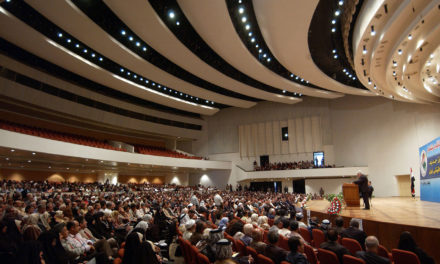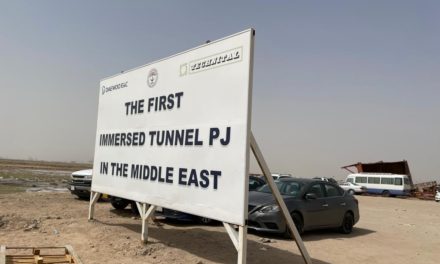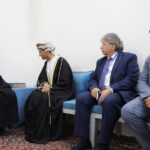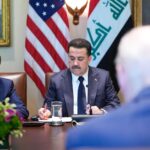Lalish Battalion, Yazidi PMU
Iraq’s Yazidi community remains deeply traumatized by the genocide carried out against it by the Islamic State beginning in August 2014. As if the mass murder, enslavement of thousands of women, and destruction of their ancestral homeland were not enough, Yazidis also face suspicion and unchecked abuse at the hands of Kurdistan Regional Government (KRG) authorities; their self-proclaimed protectors.
In December 2016, Human Rights Watch reported on the KRG’s long-running, if unofficial, economic blockade of Sinjar; the ancestral Yazidi homeland and site of the genocide. Ostensibly, the blockade serves the purpose of restricting goods to be used by the rival Kurdistan Workers’ Party (PKK) and its affiliates in the district. However, the cost of arbitrarily proscribing imports like rice, pillows, and livestock into Sinjar has been borne primarily by Yazidi civilians themselves and has deterred many from returning home to rebuild.
At the root of all the heavy-handedness lies the singular failure of the Kurdistan Democratic Party (KDP) Peshmerga to defend Sinjar when the Islamic State invaded the district in 2014. The subsequent genocide and enslavement saw Yazidi trust in the KRG’s ability to defend them in the future plummet indefinitely. The situation was further complicated by the timely deployment of PKK guerillas into Sinjar at the onset of the genocide, who successfully defended the mountain against a horrendous siege by the IS militants.
After the liberation of the district’s north in late 2014, Sinjar was effectively divided into two spheres of influence; the KDP and the Sinjar Resistance Units (YBS), a creation of the PKK which has received occasional support from the Popular Mobilization Units (PMU). A kind of uneasy peace held between the two forces (with some exceptions) as each party sought to gain the support of those Yazidi residents who remained in Sinjar.
The advent of the Iraqi Government’s Mosul Offensive and subsequent campaign to liberate southern Sinjar introduced a third and potentially more potent competitor for the district’s hearts and minds; the Yazidi Lalish Battalion of the PMU. The existing factions that predated the Lalish’s arrival in the south had cause for concern about this new development. The ruling KDP maintained its dominance in the north through a combination of patronage, intimidation, and sheer force. The YBS on the other hand, while having earned the good will of locals for its defense of Sinjar, succeeded in angering many Yazidis by forcibly conscripting and indoctrinating children into an ideology alien to Sinjar’s conservative mores.
An all-Yazidi PMU, sponsored and fully funded by Baghdad and not beholden to rival Kurdish parties, offered a third way between the aggressive competition of the KDP and YBS. The thirst for such an alternative was demonstrated almost immediately after the PMU’s assault on the last IS-controlled villages of Sinjar in May. Hundreds of Yazidis, previously serving in either the Peshmerga or YBS, defected and flocked to the banner of the PMU.
In the days following these events, I had the chance to meet with a member of Lalish Battalion which is based in southern Sinjar. The man, who I’ve referred to as Hadi to protect his identity, shared his own motivations for joining as well as the dangers he and his comrades face in Kurdistan due to their allegiance.
The interview was conducted at a camp for IDPs in the Kurdistan Region in May:
How long have you been a member of the PMU?
I joined shortly after the Mosul Offensive began in November 2016.
Had you been in the military before that? Peshmerga? Iraqi Army?
Peshmerga? No. But I fought in the Iran-Iraq War during the time of Saddam’s regime.
There are many Yazidis who fight for the Peshmerga. Why did you not join them instead?
The KDP Peshmerga are the ones who abandoned us to genocide and made this catastrophe possible. They promise us freedom, but their promises are empty. They have established Yazidi units not because they care about Yazidis, but for their own benefit and because they want to use us to control Sinja for their own ends.
What is the meaning behind the name of the Lalish Battalion?
It is named after the Yazidi holy temple of Lalish in Sheikhan.
How many soldiers are in the Lalish Battalion?
There were about 130 before the liberation of southern Sinjar. But our ranks have grown since then by many hundreds.
You fight alongside other PMU?
Yes, with the Imam Ali Brigades and others.
What is the relationship like between Lalish Battalion and the other militias?
We work closely with the other PMU and Shia militias. They treat us very well and as equal soldiers to them. They provide us with weapons, and we receive our salaries from the central government through the PMU.
What is the relationship like between the Yazidi PMU and YBS? Do they collaborate at all?
Yes, we have a good relationship with them as well. They are Shingaly Yazidis like us. But we do not really work closely with them. We receive our orders, and they receive theirs.
Has Lalish Battalion been active in the Mosul Offensive?
In Mosul city, no. Until recently, we were fighting to the west in the villages around Tel Afar. And when the campaign to liberate Sinjar’s southern villages began, we fought there as well.

Yazidi clergy meeting with PMU fighters after the liberation of southern Sinjar
Now that Sinjar is liberated, what will the Yazidi PMU do? Will they demobilize?
We will continue fighting beside the PMU in and around Sinjar until all of IS is defeated there. The Yazidi forces are not going anywhere after the war. We will stay in our villages and our homes to protect them. We will never allow ourselves to depend on others for our protection.
What happened in the immediate aftermath of Sinjar’s liberation by the PMU? How did other forces in Sinjar react?
The Peshmerga played no part in the liberation of the south. Naturally, the Yazidi Peshmerga were frustrated by this since many of them are from the south. In the days following, there were hundreds of Yazidis who defected from both the Peshmerga and the YBS to pledge allegiance to the PMU. Many previously independent fighters also joined us. We accepted any who would come, and since then, another Yazidi unit of PMU was established called Kojo Battalion.
What was the reaction of Yazidi commanders in the Peshmerga to the defections?
Qassem Shesho (commander of Yazidi Peshmerga) was angry because he knows he is losing influence and soldiers. He played no part in the south’s liberation, so it looks humiliating for him now. His soldiers spent nearly three years waiting for this moment, but they were not permitted to take part. That’s why many of them came over to the PMU.
How did the KRG respond to these defections? Have they tried stopping them?
Yes, they have arrested some Yazidis who joined or tried to join. Those of us who are members try to keep a low profile and not draw any attention to our loyalties. Because we know the police will harass us and our families.
How will governance in Sinjar look now that IS is gone?
Ideally all of Sinjar would be united, and we Yazidis would be responsible for its defense, but in practical terms, Sinjar will probably remain divided into three zones; KDP, YBS, and PMU.
Are there any plans to rebuild the southern villages of Sinjar?
So far, the PMU has promised nothing like that. If anything, the responsibility will fall to us and the central government in the future.
Do you think many Yazidis will return to southern Sinjar in the future?
If the security remains there, then yes, people will return. And just as importantly, if the villages are rebuilt. They don’t want to remain in the camps any longer, but families can’t return when the villages are completely destroyed and there are no services. That said, the PMU will not prevent anyone from returning to the south.
What about the KDP? Will they prevent civilians from returning?
The KDP will prevent you from drinking your tea! They will prevent you from smoking your cigarettes! Of course! It is not in their interest to see everyone leave the camps and rebuild Sinjar. That is why they make it so difficult to bring goods into the north. They know that if everyone goes home, then the party will lose its influence there because people don’t trust them.
Who do most of the Yazidis in Kurdistan support of all the groups there?
The majority? Without question the PMU. But there is a feeling of fear among the Yazidis because they are worried about what the KDP will do. They are not free to join and they are not free to talk about it without consequences. It’s true we’ve had many join our ranks in spite of these risks, but there would be far more if there was not the fear.
There are rumors that the Kurdish police are threatening any Yazidi who joins the PMU. Is there any truth to this?
Yes, I can attest to this personally. I have received phone calls several times from the police here in Kurdistan. They suggested very strongly that I should cease my association with the PMU or else my family and I will have to leave Kurdistan. But they will not deter me.
Do you feel safe here in Kurdistan?
How can I? There are spies everywhere, including in this camp. Since you and I began talking, a man has walked past this tent twice. He wears no uniform, but he works for the police as a spy. They know who I am and what I belong to. I joined the PMU because I wish to fight the monsters who destroyed my homeland and destroyed my life. I have no regrets. My conscience is clear.
In the weeks that followed my meeting with Hadi, KRG authorities began moving against those Yazidi PMU members residing in Kurdistan. Human Rights Watch has documented dozens of cases since June of unlawful collective punishments meted out not just on individual fighters, but on their relatives as well; a policy that runs contrary to international law. Typically, it begins with phone calls and threats to family members that their relative in question must cease his association with the PMU. If the demand is not heeded, families are given as little as 24 hours to prepare before being escorted by the police to Sinjar and return to their village of origin, regardless of its condition. For their part, the KRG has denied any such expulsions have taken place, but hinted at the PMU without naming it specifically that the government “firmly opposes any forces or militia movements that pose a threat to the security in the Kurdistan Region”
In August, KRG authorities finally made good on their threats against Hadi. He was expelled from his IDP camp and informed that neither he nor his immediate relatives were welcome in Kurdistan any longer. They were told to leave at once and return to their destroyed village in southern Sinjar. Later that night, the family disassembled their tent and packed their few belongings in a truck. Three years after their village was invaded, Hadi and his family were finally going home, albeit not willingly. The Islamic State had shattered their past and the life they once knew. Now, the KRG’s lawlessness was threatening what little certainty they had for the future.

Bradley Brincka
Bradley Brincka is a former US Army officer and worked as a volunteer ambulance driver for the Free Burma Rangers in Mosul from January to May 2017. He is currently majoring in Arabic at Ohio State University in the US.










